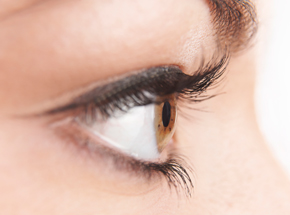 Dry eyes is a common complaint – especially in those over age 40 and even more in postmenopausal women. With less production of natural tears, the surface of the eye becomes dry one can experience feelings of burning, irritation and foreign body sensation. Also if the cornea is dry the vision can become blurred. There are various treatments for dry eyes such as artificial tears. Reversible occlusion of the tear ducts (punctal plugs) can be done so one’s own tears or artificial tears stay on the surface of the eyes longer. Medication such as Restasis drops help foster the production of more tears from the tear gland.
Dry eyes is a common complaint – especially in those over age 40 and even more in postmenopausal women. With less production of natural tears, the surface of the eye becomes dry one can experience feelings of burning, irritation and foreign body sensation. Also if the cornea is dry the vision can become blurred. There are various treatments for dry eyes such as artificial tears. Reversible occlusion of the tear ducts (punctal plugs) can be done so one’s own tears or artificial tears stay on the surface of the eyes longer. Medication such as Restasis drops help foster the production of more tears from the tear gland.
If you don’t have dry eyes now can you develop dry eyes from LASIK? If you already have dry eyes can LASIK exacerbate it?
Dry eyes can result in the early postoperative period of LASIK. This is because with LASIK a protective flap is created. When making the flap corneal nerves are inevitably cut. As a result, the eye is number and the blink frequency decreases. With a decreased blink frequency tears tend to evaporate more during the day resulting in a dryer eye as the day goes on. Studies have shown that these nerves begin to regenerate soon after the procedure and this process is complete by around 6 months after surgery. Studies have also shown that dry eye signs and symptoms closely mirror this regeneration and significantly decrease over that 6 month period. With blade-free laser-made flaps compared to the older blade-made flaps, the flaps can now be safely made thinner and thereby cut or damage fewer nerves. This is probably the main reason why dry eye after LASIK is considerably less now than it had been years ago when we made those thicker bladed flaps.
A recent prospective study performed together by John Hopkins and Walter Reed Hospitals showed that the incidence of chronic dry eye (greater than 6 months postop) after LASIK on those that had no dry eye preoperatively was only 0.8% (less than 1 out of 100 patients). However many patients, especially those over 40, have some level of dry eye prior to having LASIK. Are they candidates for LASIK?
Before having LASIK surgery, you’ll have a consultation with your doctor. They’ll ask for your full medical and ocular history including any history of dry eyes. An examination will also be done to determine if there are any signs of dry eye. If signs of dry eye are noted during the exam the LASIK surgeon will determine if you are a candidate for the procedure. Most patients with mild or moderate dry eye are excellent candidates for modern LASIK. Preoperative treatment with reversible punctal occlusion or Restasis may be recommended. Those with very severe dry eyes may be told they are not a good candidate for the procedure. Of course, many who have no dry eye problem prior to LASIK will experience some amount of dryness during those first 6 months after the procedure. Fortunately, treatment with artificial tears, punctal occlusion or Restasis usually works very well for those patients.
If you have questions about the risks and benefits of LASIK or laser eye surgery, Dr. Lipstock is happy to help. You may even find the answer to your question on our LASIK frequently asked questions page. The only way to know for sure if you are a candidate for LASIK is a comprehensive exam from a LASIK surgeon. If you live in Richmond, Virginia and are considering LASIK, schedule your free consultation with Lipstock LASIK & Cataract Center today.